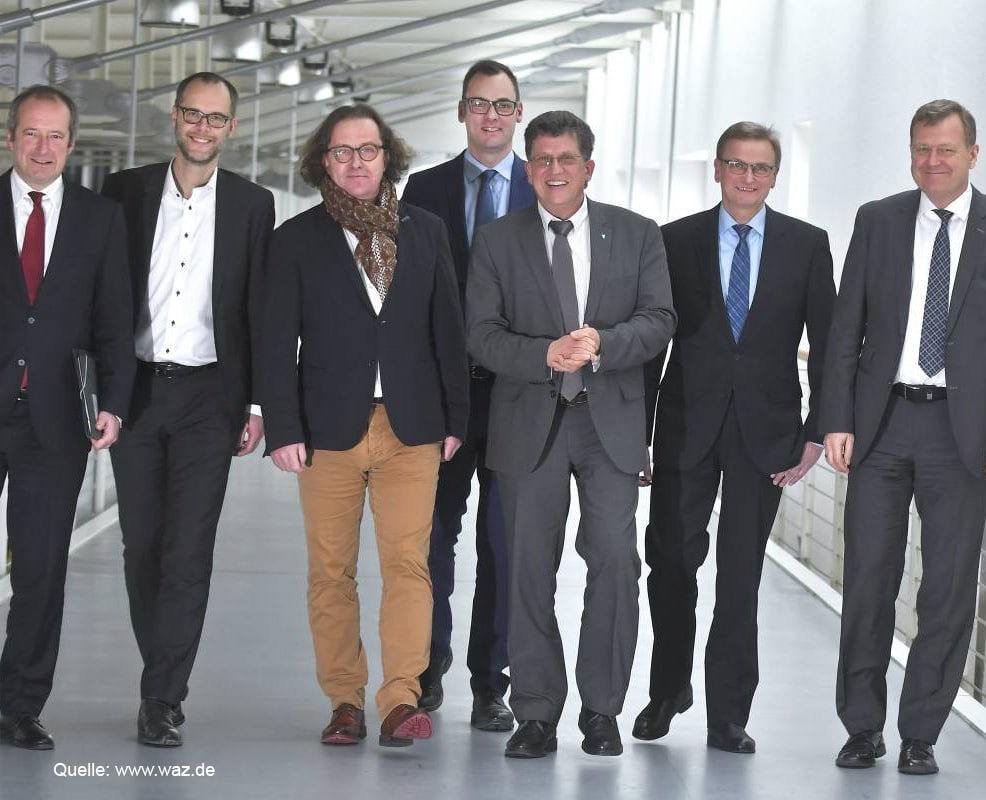
28 Jan “Power2Metal”
GELSENKIRCHEN COOPERATION TO FURTHER DEVELOP HYDROGEN AND BURNER TECHNOLOGY FOR MODERN ENERGY SUPPLY IN THE METAL INDUSTRY – AVOID CO2
The aim of the “Power2Metal” project – for which the project partners will also submit an application for funding to the Federal Ministry of Economics and Technology – is to sound out the opportunities for complementary hydrogen-based energy systems for energy-intensive, medium-sized metal finishing in Germany and then to develop them on a pilot basis in Gelsenkirchen.
The “Power2Metal” partners are: The Westphalian Energy Institute at the Westphalian University of Applied Sciences, which accompanies the project scientifically; GELSENWASSER AG as an energy supplier, which supports the development of the hydrogen complementary system; Kueppers Solutions, which is responsible for the further development of the thermoburning technology used; Voigt & Schweitzer GmbH & Co. KG with a focus on the surface finishing of steel, which is available as an application partner through its subsidiary ZINQ Technologie.
The core of the project
The previous energy source for process heat in metal finishing is natural gas – recognized as the most environmentally friendly fossil energy source. But in order to save CO2 on a larger scale, natural gas is to be gradually and largely replaced by hydrogen in the future. Hydrogen can be produced and stored by electrolysis during the conversion of surplus, regeneratively generated electricity. The combustible gas can be converted into electricity again later, but it would be far more efficient to use hydrogen directly as a substitute for natural gas in existing heating processes.
The adaptation of these processes, for example in the area of burner control, is a challenge in a metal processing company – as in other branches of industry. For this reason, a study must first investigate how processes with modified gas compositions can run stably and trouble-free. The study will also examine how large the potential for energy and economic savings, as well as the CO2 savings, are with different metal finishing processes in different transition scenarios.
In a subsequent pilot project in Gelsenkirchen, an alternative supply, storage and low CO2 combustion will be demonstrated using the example of hot-dip galvanizing. With this “Power2Metal” pilot plant, further knowledge and measurement data will be gained in real operation. These will then also form the starting point for future business models of the German energy industry.
Project partners introduce secretary of state Oliver Wittke MdB the cooperation
State Secretary Oliver Wittke, from the Federal Ministry of Economics and Energy, informed himself about this innovative approach in Gelsenkirchen: “In order to achieve greater independence from natural gas as a fossil fuel and to avoid CO2 emissions, we need intensive and technology-open research and development in industry. I am delighted that this exciting project in Gelsenkirchen is following this path along the entire value chain in the metal industry. There is great potential here to secure jobs at the site and, above all, to modernize energy-intensive metal finishing processes that are relevant for SMEs,” says Wittke, describing his first impression of the research project.
The motivation: Which partner does what?
The ZINQ Group is involved in the project with Voigt & Schweitzer Gelsenkirchen GmbH & Co KG, which has about 100 employees and hot-dip galvanizes steel components, and ZINQ Technologie GmbH, which is responsible for all R&D activities of the group.
With this project, the group underscores its reputation as one of the 100 most innovative companies in Germany: “The energy revolution concerns us all. As a Cradle to Cradle certified company, we want to contribute to the achievement of the CO2 targets.
The energy-intensive metal finishing industry needs sustainable paths and innovations. Together with our project partners, we want to work out how we can make hot-dip galvanizing processes less dependent on natural gas as an energy source, says Managing Director Lars Baumgürtel.
The Westfälisches Energieinstitut is responsible for the scientific support of the research project. “There will be no successful energy revolution without hydrogen. That is why we have been researching hydrogen systems here in Gelsenkirchen at the Westphalian Energy Institute for years. Since people in the Ruhr area have a lot of experience with hydrogen-rich coke oven gas, this is the place and the time to advance research into such an alternative energy supply approach,” explains Prof. Dr. Michael Brodmann, Director of the Westphalian Energy Institute.
CEO Henning R. Deters describes Gelsenwasser’s motivation: “This joint project is exactly our thing. We see ourselves as a development partner for our customers. This understanding goes far beyond the supply of water and energy. Rather, we support our customers in all questions and tasks relating to the use of our products and sustainable, environmentally compatible solutions. Only a scientifically founded, practice-proven and affordable change in energy supply can be successful in society. We are convinced that this project will contribute to this.”
We, the company Kueppers Solutions, which as a specialist for pollutant-optimized combustion technology in industry and commerce has commissioned more than 10,000 plants, are very interested in providing technical support for this project and further developing the burner technology. Managing Director Jens te Kaat says: “Our mixing unit, which is manufactured using metallic 3D printing, already enables very low-nitrogen oxide combustion of natural gas today – but we can only exert a limited influence on CO2 emissions. By adding hydrogen, CO2 can be significantly reduced – unfortunately to the detriment of nitrogen oxides, if nothing is done about it. We are happy to accept the combustion challenge of using natural gas, hydrogen and the mixture of both fuels in one plant without other pollutants rising.
Gelsenkirchen, 24. january 2019



